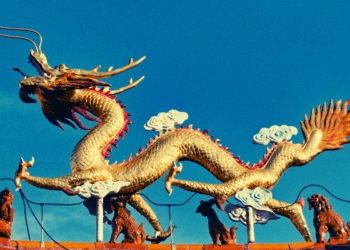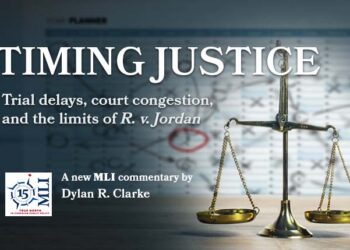The moral of Macdonald requires acceptance that his flaws are ours, writes Senior Munk Fellow Alastair Gillespie in the National Post. One can only speculate whether a more pure leader could have kept the country together.
by Alastair C.F. Gillespie, January 13, 2015
Two hundred years from his birth, we reflect on the legacy of John A. Macdonald neither to exalt unthinkingly, nor to cast the past aside. Macdonald both founded a nation and was a flawed creation. His legacy is an imperfect but recognizably Canadian statesmanship characterized by compromise and coalition-building, managing the diversity already present in his early Canada. If nations are imagined communities, remembrance of his successes and disappointments can help us build the Canada of tomorrow.
Macdonald practiced his craft in a recognizably Canadian context, under parliamentary institutions governing a population characterized by cross-cutting cultural, linguistic and ethnic allegiances, with the complication of bitter Catholic-Protestant religious sectarianism. This situation offered politicians a choice between two paths to power: The path of confrontation at the head of a single region or group, or the path of compromise and coalition-building, with policies that had a chance to bridge divides. The first was chosen by Macdonald’s arch-rival George Brown, the leading political figure in Canada West (what is now Ontario), the second by Macdonald, who cultivated relations with French Canadians and built a moderate Liberal-Conservative coalition.
The path of confrontation at the head of a single region or group, or the path of compromise and coalition-building, with policies that had a chance to bridge divides.
With its cross-cutting allegiances, Canada rewarded and punished both strategies. In the old assembly of the Province of Canada, with equal seats for growing Canada West and less populous Canada East (now Quebec), Brown rode the populist Protestant tiger with his demand for “representation by population,” i.e. more seats for Canada West. Without Quebec support Brown ruled in the west, but was consigned to permanent opposition. Macdonald, though able to enter governments with his French Canadian allies, was reduced to an increasingly fragile minority in Canada West. He was vulnerable to Brown’s charges of selling out to French domination and the supposedly malign influence of the Roman Catholic Church, of being the malevolent architect of shabby and unprincipled deals. Yet only Macdonald was rewarded a central role in Confederation and the fruits of lasting power — why?
Macdonald became the first Canadian statesman because the fundamental fact of Canadian politics — the linguistic, ethnic and religious diversity of its population — meant that the path of compromise, however imperfectly pursued, was the path to power. His strategy was successful because it was suited to the raw materials he had to work with.
One governor-general set out this terrain of Canadian politics: “whatever may be the personal convictions and whatever may be the religious belief of a Canadian politician, if he means to lead his countrymen as a whole, he must school his mind to principles of toleration, and he must learn to respect the feelings and even the prejudices of others who differ widely from himself. He must imbibe the conviction that there are two sides to every question with which a statesman has to deal.” Here was the task of leadership in Canada. Here was Macdonald’s métier.
We now know the frontiers of Canada Macdonald worked to expand were not only the physical — the iron spine of the CPR stretching away to the sea — they were also frontiers of the spirit.
Though a reluctant convert to federation, Macdonald accepted it both as the only practical way to unite the colonies, but also because of power. Federation was the only option to unite the scattered colonies acceptable to French Canadians and the maritime provinces. Without confederation, Macdonald ran the risk Brown would carry Ontario and Quebec only, replacing him in his position of leadership. With their deep personal antipathy, Brown and Macdonald “grasped each other not by the hand but by the throat.” After 1867 Macdonald gained a wider chessboard amenable to his craft, and the prospect of conservative support in the new provinces which could be called in to redress the balance of his weakness in the west.
To Macdonald fell the leadership of the new Dominion for almost 20 years, and rich opportunities to vindicate or violate the possibilities of a genuinely Canadian statesmanship. Laurier credited Macdonald with an “inner, subtle, indefinable characteristic of soul that wins and keeps the hearts of men,” but faulted him for making Canadians feel that “politics was not only a game but a game without rules.” Macdonald liked power, and the path of power meant sometimes the commission of errors and grave injustices, some recognized in his time, others which shock the conscience only today.
Yet one contemporary newspaper recognized that Macdonald with all his faults might also have been a necessity: “Sir John Macdonald may be the Prince of Darkness; with some of its imps he is certainly far too familiar. But an angel of light would perhaps have not been so successful in holding together the motley and discordant elements, local, ethnological, religious, social and personal, on a combination of which the Dominion government has been based; or if he had, it would not have been without detriment to his seraphic purity.” This was “the excuse if not the justification of Sir John Macdonald.”
This anniversary, we now know the frontiers of Canada Macdonald worked to expand were not only the physical — the iron spine of the CPR stretching away to the sea — they were also frontiers of the spirit. In this Macdonald made only a beginning, and an imperfect one. If today we dwell on Macdonald’s disappointments, it is as the product of forces that shaped his career, and the developing ideals of the country he set in motion. A diverse population under parliamentary government has tended to wear away prejudice and develop the aspiration to do equal justice to all, regardless of national origin or creed.
The moral of Macdonald requires acceptance that his flaws are ours, for they are written into the history of Canada. We properly recall Macdonald’s triumphs and his tragedies, his faults and his virtues, recognizing in them the conditions and the contingency of our own greatness.
Alastair Gillespie is a Canadian lawyer working in London England, and the author of a series of articles on the Confederation Debates which appeared last year in the National Post.




